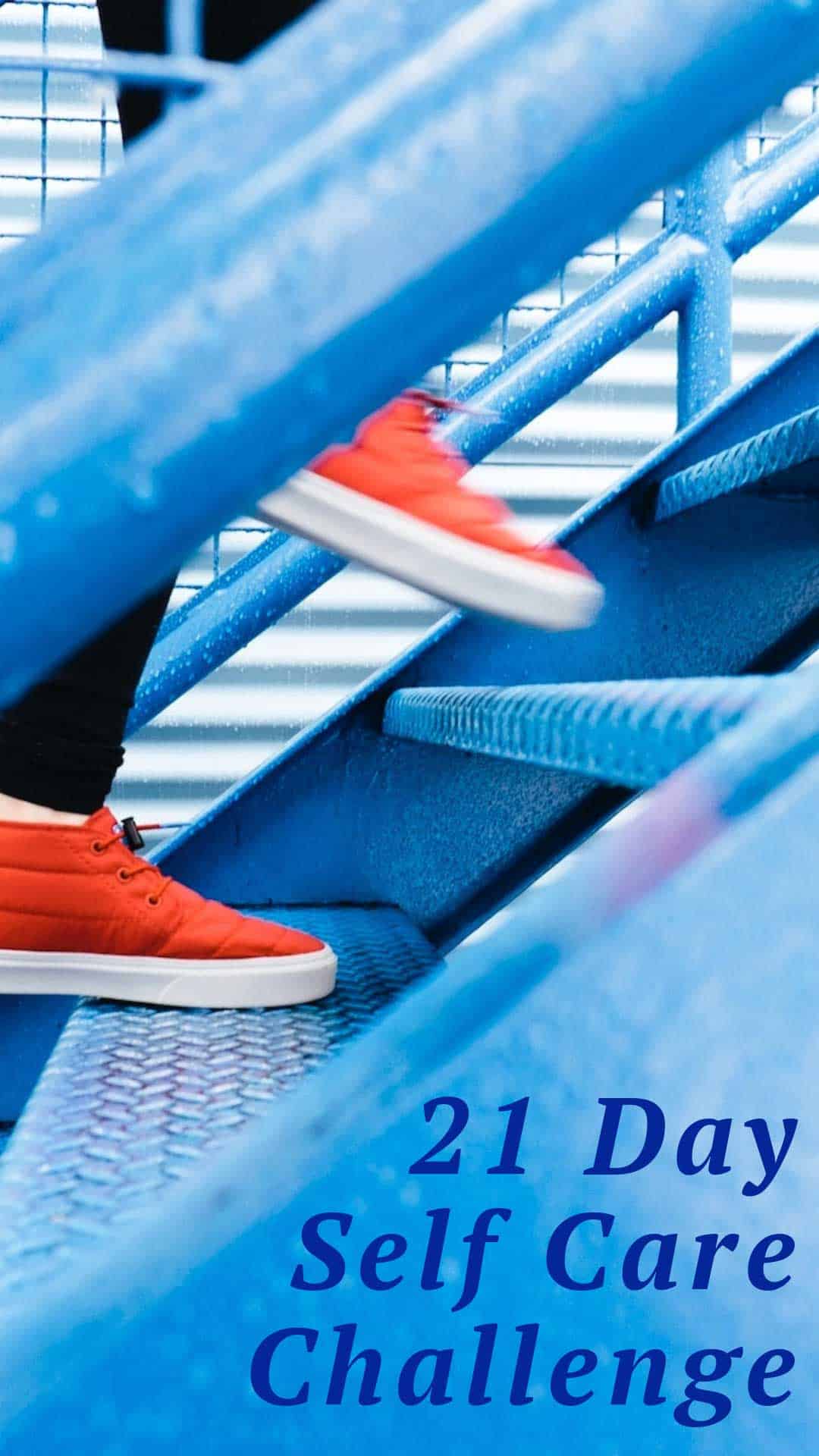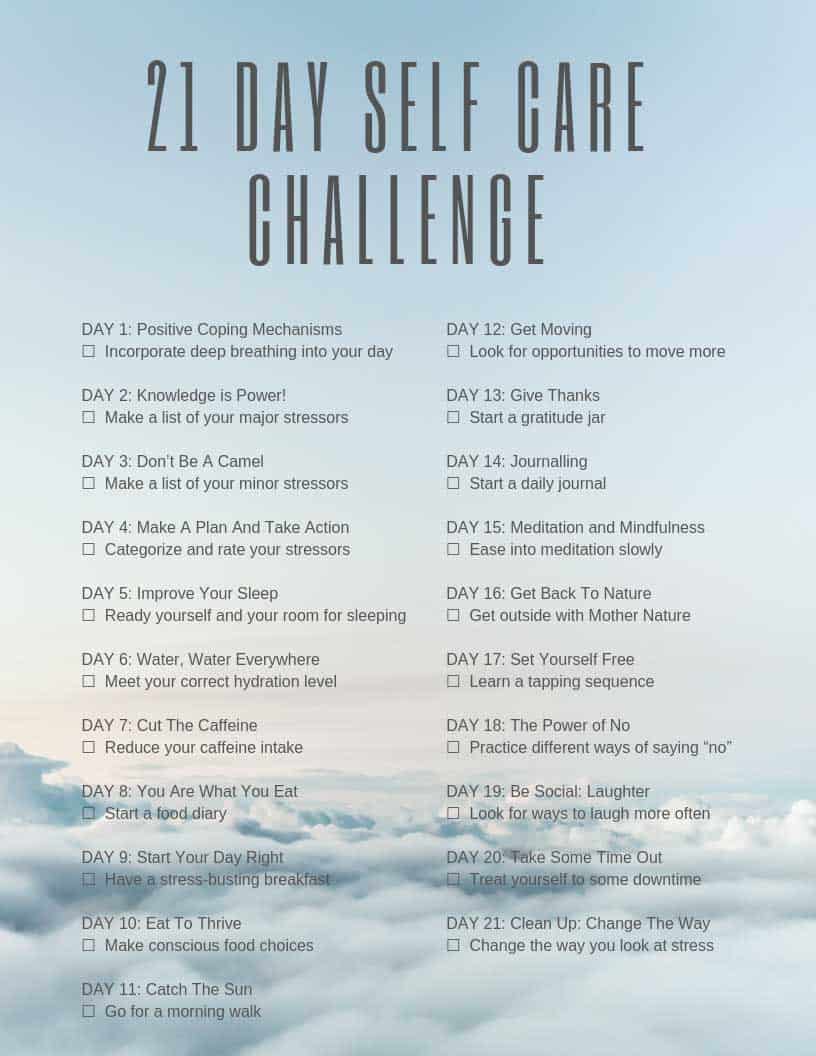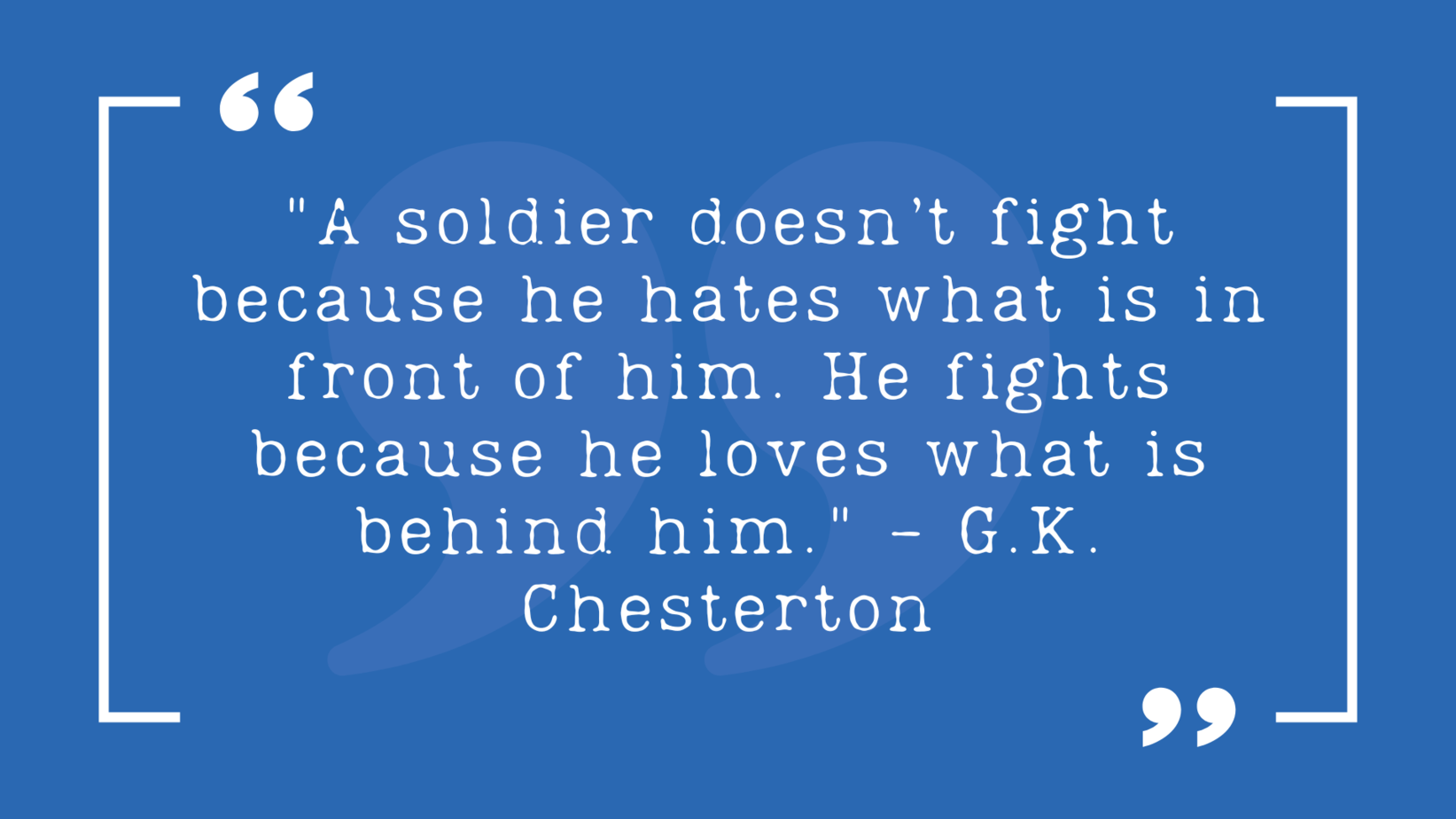The content on this site may include affiliate links. As an Amazon Associate I earn from qualifying purchases. This means that, at zero cost to you, we will earn an affiliate commission if you click on one of the links and buy something.
21 Day Self Care Challenge
I think it’s true to say that for most of us the hardest part of incorporating a self care routine into our lives is finding the time and the focus to actually do it.
We want our lives to be less stressful.
And we know that taking care of ourselves will improve out mental and physical health.
But we’re just so darn busy taking care of everyone else that we can’t seem to carve out the time to include some much needed self care into our day.
Putting “implement a new self care routine” onto our tasks lists is just going to result in us putting it off time after time.
Because it feels too big.
Because we have no idea where to start.
Well that’s why we designed this 21 day self care challenge!
We’re going to break that seemingly overwhelming task into 21 bite sized actions.
Baby steps you can take each day to introduce this much needed change into our lives.
At the end of the 21 days you’ll have taken massive positive action.
You will have changed the way you do things.
You will have changed the way you think about things.
And most importantly you’ll have new tools and techniques you can use to make self care a natural part of your day.
Are you in?
Day 1: POSITIVE COPING MECHANISMS

You probably already have a couple of coping mechanisms you use when you’re feeling stressed.
Maybe you comfort eat?
Maybe you look forward to a glass of wine when you get home at night?
Unfortunately those are negative coping mechanisms and you need to replace them with positive ones that will help you fight stress, not hinder your ability to do it.
Deep Breathing
It sounds simplistic, but deep breathing is one of the most effective coping mechanisms for managing stress.
Slowing down your breathing and taking deep breaths instead of shallow ones sends powerful signals to your brain that you’re doing great.
No need to fight, no need to flee, so chill out brain!
Try this now:
1. Find a comfortable position. You can either sit on a chair or lie down, but make sure you relax your tummy muscles. Don’t worry if your tummy sticks out, you need to let your diaphragm move!
2. Put the flat of one hand just below your belly button and breathe slowly through your nose until your lungs are full. You should feel your stomach expand about an inch and your chest rise slightly at the same time.
3. Now breath out slowly through your mouth or your nose, whichever you prefer.
4. Practice this “relaxed belly breathing” for several minutes.
Feel’s good, doesn’t it!
Allowing your diaphragm to move while breathing delivers richer oxygen to your cells and is beneficial to your overall health, as well as your stress levels.
So today’s task is to…
Incorporate deep breathing into your day.
Make a point of doing it for 5 minutes in the morning so you start your day in a relaxed state, and then once in the evening, to help you relax before bedtime.
You can also practice while waiting in traffic, on the bus or train to work, or even while in line for your lunchtime sandwich.
It should be a powerful feeling knowing that you can now keep your stress levels under control anytime, anywhere!
Day 2: KNOWLEDGE IS POWER!
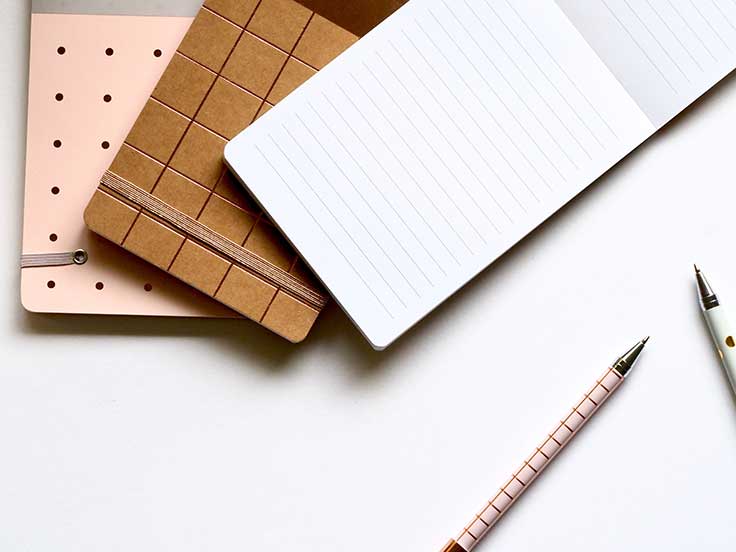
Knowing the culprits behind your stress or anxiety is the first step in eliminating it, or at the very least lessening their negative effect on you.
Even though stress is an involuntary reaction, you can control how often stress kicks in and for how long.
You can do this by identifying the known stressors in your life and then reducing them to the bare minimum.
So your task for today is…
Make a list of your major stressors
Grab a notepad and write down the biggest things in your life that you find stressful or that make you feel anxious.
This could be not liking your job; having financial problems, or being in an unhappy relationship.
We call these major stressors.
There could be more than one, so start with the first one that comes into your head (that’s probably the biggest culprit) and write that down as a heading.
Let’s say you wrote down “Your Job”.
Now dig deeper and drill down further.
What is it about the job that you don’t like?
Be specific and write down the particular parts of your job that are making you unhappy.
Let’s say you wrote down “My Boss”.
Be more specific.
What does he do to cause you so much stress?
Write down everything!
Keep digging deeper until you get to the root cause of the issue.
If there is more than one major stressor in your life, you can now repeat the process with the next one.
Ultimately you need to know everything that is contributing to your stress levels or making you feel anxious
The more detailed you are, the more information you will have to get to the root of the problem and start doing something about it.
Stress doesn’t go away by itself – you have to make it!
Phew! That was difficult, wasn’t it!
In fact, you probably found it quite a stressful exercise in itself.
But it had to be done, so take a moment to give yourself a pat on the back.
You did well!
Now would be a good time to practice yesterday’s breathing exercise!
DAY 3 – DON’T BE A CAMEL

Have you heard the saying “the straw that broke the camel’s back”?
It means that little things that seem insignificant can have a massive effect on us when they’re all added together.
That’s why today’s exercise is all about identifying the minor stressors in your life – your “straws” as it were.
You might have some joint pain for example that you see as more of “a niggle” than a stress factor.
Or it could be something like your clothes always feeling tight because you’ve added a few pounds over the last year.
These minor stressors need to be dealt with too – not left to fester and compound your major stressors.
So your task for today is…
Make a list of your minor stressors
This exercise will probably make you think harder than you had to yesterday.
Minor stressors in our lives are often those things that we have learned to live with.
They’re with you constantly so have blended into the background and become almost normal.
This makes them much harder to identify so you will need to really think.
Take your notepad from yesterday and write down everything that you wouldn’t necessarily identify as a cause of stress, but that doesn’t make you feel good.
Maybe it’s the colleague at work who always spells your name wrong when he sends an email.
Or it could be a habit that your partner has that annoys you.
Keep your notepad handy throughout the day and write down anything that you didn’t think of straight away.
Don’t think of this exercise as nitpicking.
If it affects you it matters.
Remember the poor Camel.
You don’t want to be him right?
DAY 4 – MAKE A PLAN AND TAKE ACTION
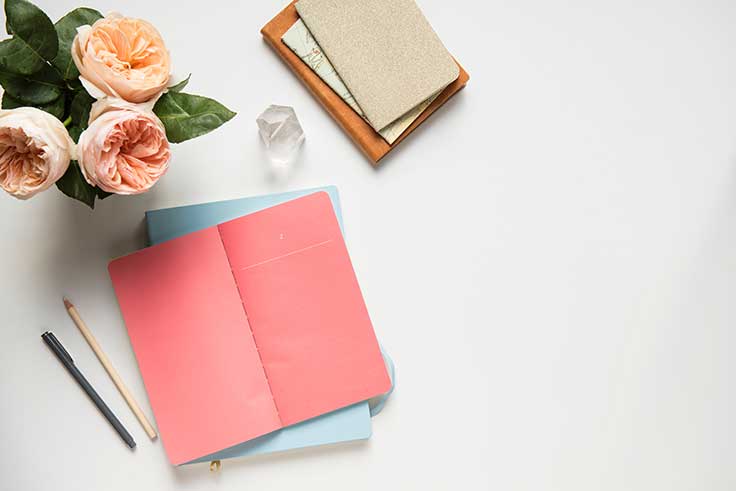
You should now have a fairly detailed list of everything that you’ve identified over the last two days as being either a major stressor or minor stresses in your life.
Now it’s time to organize them.
Your task for today is…
Categorize and rate your stressors
Take a fresh sheet of paper and draw three vertical lines to make four columns.
Name the columns something like “Home”, “Work, “Health” and “Finances”.
Now take your list of stressors and put each one into its correct category.
Next rate each stressor on a scale of 1 to 10 depending on how easily you think each one could be dealt with.
Once you’ve completed that part of the task, choose one of the stressors from each column and start thinking about what you can change.
Start with easiest first and work your way through.
For example, if your daily commute in heavy traffic is in the “Job” column, could you leave 15 minutes earlier to avoid the jam; or could you take a slightly different route?
If your partner’s snoring is in the “Home” column because he’s disturbing your sleep, have you tried suggesting he wears an anti-snore patch?
He might not even realize his snoring is so bad!
If struggling to pay off your credit card is in the “Finances” column, can you rein in your spending and eliminate unnecessary expenses like takeaway coffees or the cable TV you never get time to watch anyway?
Sometimes it’s easier to keep doing exactly what you’ve always done and stick to your routine.
Change can take you out of your comfort zone, even though the things that need to change are making you uncomfortable.
By looking at different ways of making small changes, you are not only taking control of your situation, but you can also probably eliminate quite a few of the things that are contributing to the amount of stress in your life more easily than you ever thought.
DAY 5 – IMPROVE YOUR SLEEP

If your sleep is being disrupted because of stress it’s a double whammy for your mind and body.
Feeling physically and mentally exhausted from tossing and turning all night is just the tip of the iceberg.
Sleep is a hugely important part of your self care routine. It’s the time when your mind and body normally work together to repair, restore, heal and grow.
If that’s not happening the way it should be, you are at a huge disadvantage in your fight to combat stress.
Let’s stack the odds in your favor by getting your sleep back on track.
Today’s task is to…
Ready yourself and your room for sleeping
Your Room:
Install blackout blinds or heavy curtains to prevent light from street lights or neighboring houses getting in and disturbing your sleep.
If this isn’t possible, wear a sleep mask instead.
You sleep better when your body is cool so keep a window open, have the ceiling fan on or use lighter blankets if you find yourself waking up because you’re too warm.
Turn off your smartphone or switch it to airplane mode to prevent the emission of EMFs which interfere with melatonin levels.
Yourself:
Now you need to establish a regular bedtime routine, because they’re just as important for us grownups as for our children!
Having a regular routine can work wonders for your sleep pattern.
Train your mind and body to recognize that it’s time for sleep, the same way you established a regular bedtime routine for your baby.
Work out what time you need to get to bed by to get 7-8 hrs sleep, then set an alarm to switch off your computer, phone, tablet etc. at least an hour beforehand.
This will help stop them interfering with your melatonin levels and tricking your brain into thinking it’s NOT the time for sleep.
You should also plan to do something relaxing such as meditating, or reading a book while sipping on a cup of chamomile or passionfruit tea.
When you teach your brain and your body to recognize the signs, and you create an atmosphere conducive to sleep you have a much better chance of catching the quality zzzs you need to combat stress and improve your wellbeing.
DAY 6: WATER, WATER EVERYWHERE

Drinking water isn’t just a way of quenching your thirst.
Water is essential for life, and it is essential in helping guard against stress.
Studies show that being even slightly dehydrated can lead to increased levels of the stress hormone cortisol and that is BAD news!
A generally accepted rule of thumb to stay properly hydrated is eight 8oz glasses of water per day.
But in reality, there is no one size fits all formula for fluid intake.
So today’s task is to…
Meet your correct hydration level
In order to meet the correct hydration level for your body weight and lifestyle, you need to first establish what it is.
Work out your body’s bare minimum requirement by using the following formula from Yuri Elkhaim who is a Holistic Nutritionist and Fitness Expert:
Your weight x 0.5 = fluid ounces of water per day
The National Academies of Sciences, Engineering, and Medicine puts the average woman at needing 11.5 cups (or 2.7 liters) a day so those figures should give you a yardstick to go by.
The average man needs around 15.5 cups (or 3.7 liters)
Start tracking what you are drinking so you know whether or not you are meeting your hydration needs.
Set a timer if necessary to ensure you’re staying hydrated throughout the day and include tea, coffee, and juices which all help you meet your needs.
If you don’t want to keep track manually you can get an app on your smartphone.
Some of them will calculate your fluid requirements for you and give you reminders, as well as tracking your overall fluid intake.
Some free highly rated ones are “My Water Balance”, “WaterLogged” and “My Water”.
TIP: As soon as you wake up, drink a glass of warm water with lemon juice to help normalize your bodily functions, fire up your metabolism, top up your water balance and give you a shot of stress-busting Vitamin C.
DAY 7: CUT THE CAFFEINE

How much coffee do you drink?
Probably too much if the “coffee culture” in some parts of the world is anything to go by.
But if you’re relying on several cups of strong coffee to get you through the day, you are not doing your health, or your stress levels any favors.
A hit of caffeine can give you a temporary mood boost, but the caffeine in one regular cup of coffee is enough to increase cortisol levels and trigger the body’s “fight or flight” response.
Keep drinking coffee throughout the day and your body never gets the chance to recover. Sorry to say it but coffee is quite literally stress in a cup.
So today task is to…
Reduce your caffeine intake
Calculate how many cups of coffee you drink in a typical day and write it down.
You don’t want to go cold turkey on your caffeine intake or you’ll end up with withdrawal symptoms like the jitters or headaches, especially if you’ve been relying heavily on coffee to get you through the day.
Instead you need to plan to reduce your intake gradually.
Swap one or two cups of coffee each day for a cup of tea, starting from today.
Tea has a lot less caffeine than coffee does, and research shows that drinking just one cup of tea each day can be beneficial to health.
As you reduce your coffee consumption, increase your tea intake accordingly.
Aim for between three and five cups of black or green tea daily, and one cup of coffee (preferably decaffeinated).
If you must have your one cup of coffee full caffeine, make sure you have it in the morning so you don’t ruin your sleep.
And of course you don’t have to switch to tea, you can just drink plain old water instead.
DAY 8: YOU ARE WHAT YOU EAT

Your diet is pivotal to your good health, but also to how your mind and body deal with stress.
By eating the right foods and avoiding the wrong ones, you are giving yourself the best chance of preventing stress and unhealthy food cravings.
A good diet also helps you combat stress when it does rear its head.
You will also be improving or maintaining your long-term health and wellbeing so it’s a win-win all around.
So today’s task is to…
Start a food diary
Write down everything you eat and drink today.
Breakfast, lunch and dinner, and don’t forget those snacks.
After you’ve eaten, think about how each meal or snack affected you.
How did you feel after eating, both mentally and physically?
Did a particular meal or snack give you brain fog?
Did something make you feel tired or lethargic afterward?
Did you have renewed energy after eating a particular food?
Learning which foods your body runs well on will empower you to make better choices tomorrow and in the future.
DAY 9: START YOUR DAY RIGHT

Yesterday you wrote down everything you ate and made a note of how each meal, snack or particular food made you feel.
What did you have for breakfast?
You’ve probably realized that you haven’t been giving your body what it needs to run as well as it could and combat the stresses of the day.
So today’s task is to…
Have a stress-busting breakfast
Eggs are a great way to start your day.
As well as being a high-quality protein, they also contain vitamin B2, selenium and the amino acid tryptophan which are all proven to help combat stress.
Try a poached egg or two on wholegrain toast spread with avocado, or whip up a quick omelet with spinach and half a chopped tomato.
Add a glass of orange juice for Vitamin C.
Oatmeal is another quick and easy stress-busting breakfast.
As well as being a source of high-quality fiber, oats also contain B vitamins and magnesium.
Use activated almond milk and add a cup of fresh blueberries for Vitamin C and a few crushed walnuts for even more stress-busting nutrition.
We have a whole month’s worth of overnight oatmeal recipes you can try to find a few that you want to add to your morning meal plan!
Smoothies are another great breakfast choice. They are super quick to make and you can add a variety of ingredients to suit your taste.
We have a whole collection of easy breakfast smoothie recipes you can try. They’re kid friendly too!
DAY 10: EAT TO THRIVE
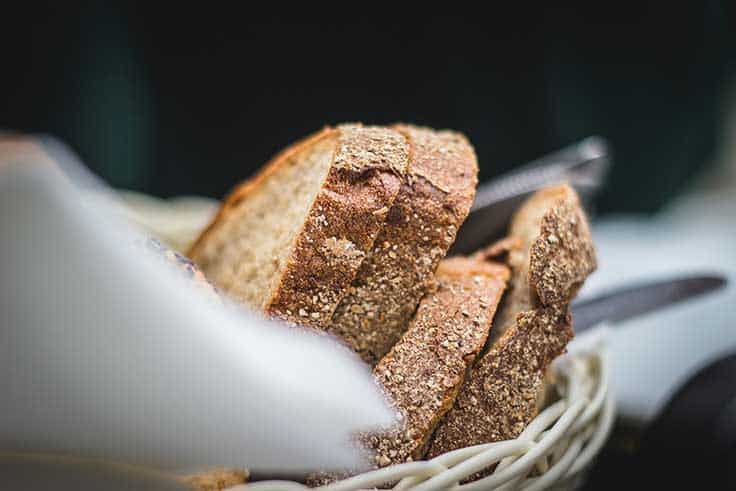
Yesterday you made the change to starting your days with a healthy, nutrition and stress busting breakfast.
Today we’re going to look at some other foods that you should be incorporating into your daily diet to help fuel your body the right way and keep stress at bay throughout the day.
Today’s task is to…
Make conscious food choices
For example you can swap your usual sugary snack for a handful of sweet, juicy berries instead because they’re full of Vitamin C, antioxidants and phytonutrients that all help fight stress.
You can choose wholewheat wholegrain bread instead of processed white bread for your lunchtime sandwich. Doing this will help stabilize your blood sugar and give you sustained energy throughout the day.
You can switch potato fries for sweet potato wedges, or try mashed sweet potato instead of white. The extra magnesium in your diet will help guard against stress.
Ditch the afternoon cookies and snack on a handful of almonds or walnuts instead. All nuts are sources of protein, fibre, magnesium, and healthy fats as well as being anti-inflammatory. All in all nuts are the perfect stress busting snack!
If you usually use iceberg lettuce in your salads switch it out for a mixture of iron rich spinach, kale and rocket (arugula). Green leafy vegetables are also rich in Vitamin C which helps regulate cortisol levels.
There are lots of swaps you can make for a healthier diet, but start with these five and you should start to notice the difference in both your energy levels and your stress level.
DAY 11: CATCH THE SUN

The amount of sunlight you get affects how you sleep and the amount of sleep you get affects your mind and body, including your ability to cope with stress.
Stress, artificial lights and blue light from electronic devices all affect the body’s natural sleep cycle and the production of melatonin.
Today’s task is to…
Go for a morning walk
Even just going outside and standing in the sunlight will allow your eyes and skin to receive the amount of full spectrum sunlight they need for proper melatonin production.
Don’t wear sunglasses, or spectacles or contacts if you use them.
You should look in the direction of the sun, to the side, but do not look right at the sun or you will damage your eyesight.
Try to walk or be outside for twenty minutes if possible for maximum benefit.
DAY 12: GET MOVING

We all know that exercise is good for our physical health, but it is also good for our overall mental health.
Ideally, you should be exercising for 30 minutes each day, but if you haven’t exercised for a while you need to start more slowly.
So today’s task is to…
Look for opportunities to move more
Grab a pen and your journal and write out a list of ways you can more more. Here are some ideas to get you started:
Park your car further away from your place of work and walk the rest of the way.
Or get off the bus or train one stop earlier.
You can park your car at the farthest side of the parking lot when you go to the store.
If you normally head straight for the elevator when you get to work, take the stairs instead.
Walking is a weight-bearing exercise and taking the stairs will get your heart rate up, make you take deeper breaths and help increase your stamina over time.
Think of it as a daily pre-work stress buster, especially if your job contributes to your stress levels.
If you like the idea of running for exercise but are out of shape, get an app such as the Couch to 5K Runner. It gives you a guided program to follow over 8 weeks and allows you to build up gradually until you can run a full 5K without stopping.
If you have joint problems you could try swimming for a low impact all over body workout.
Don’t forget opportunities to move at home too.
Switch on the reminder on your FitBit which will prompt you to get up and move at ten minutes to the hour.
Or ask Alexa to play you some upbeat tunes so you can dance in the kitchen while cooking dinner! You can try 50 Great Pop Songs of the 2000s for starters.
DAY 13: GIVE THANKS
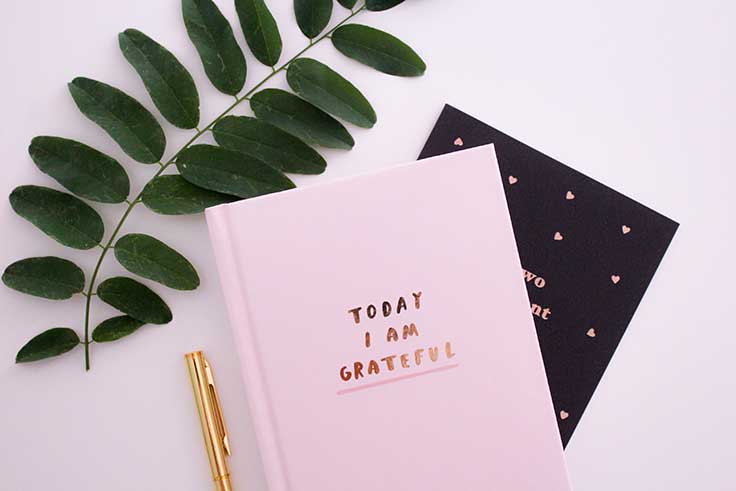
Giving thanks for what we have has proven health benefits including better sleep and reduced stress.
The simple act of writing down the things you are grateful for has been identified as having both social and psychological benefits, as well as helping your physical health.
Today’s task is to…
Start a gratitude jar
Gran a sheet of paper and a pen and divide it into four columns with eight rows.
In each section write down something in your life that has brought you happiness and that you are thankful for. Keep it simple.
For example, you might write “My loving parents” in the first section.
Then you might write “The time I went to Disneyland” on the next, “My best friend” or “I have pretty eyes” on the next.
Keep going until you’ve written something on each section.
You can also use a second sheet of paper if you need to.
Now cut the paper along the lines and place each piece into a jar.
As you do, repeat out loud what it is you are grateful for.
Keep the jar somewhere you will see it every day to remind yourself of all the positives you have in your life and how much you have to be grateful for.
Taking the time to recognize your gratitude will help you to put the things that are causing you stress into perspective.
You can turn this into a daily habit as part of your self care routine by using a gratitude journal like this one from our store.
DAY 14: JOURNALLING

Journalling is an excellent way of organizing your thoughts and keeping you focussed.
It can also be very therapeutic when it’s used as an emotional release, either to get negative thoughts out of your mind or to help you solve problems and clear your mind.
So today’s task is to…
Start a journal
Grab a notebook from your stash, or treat yourself to a new journal.
You don’t have to write in it every day but do be consistent.
Write down your thoughts on the day or the week.
Start with the positives.
Write down anything that made you smile or laugh.
Read it back and feel grateful.
Now a few lines further down write down anything that had a negative impact on your day.
Leaving the negatives to the end gives you the option of tearing that part off and throwing it in the bin.
Studies on a group of students in Spain shows that the act of writing down and physically throwing away your negative thoughts helps you discard them from your mind and stops you chewing things over again and again.
DAY 15: MEDITATION

Meditation can be very beneficial to mental and physical health and is an excellent form of self care.
It takes practice though and a lot of people find it difficult.
It can be hard to relax and clear your mind when you first get started, especially when negative thoughts are racing round in your head and you’re feeling physically tense.
So today’s task is to…
Ease into meditation slowly
Sign up for an exercise class that involves deep breathing and mindfulness such as yoga or tai chi.
Commit to going twice a week.
Once you’ve learned how to relax, clear your thoughts and focus your mind properly you’ll find it much easier to just sit and meditate.
If there are no suitable classes or you want to start meditating straight away, you can get started with a guided meditation app instead. Check the app store for 10%Happier or Headspace.
DAY 16: GET BACK TO NATURE

Humans evolved with nature all around and so being outside is our ecological comfort zone.
It’s no coincidence that you immediately feel calmer when you take the time to look up and watch the clouds, or when you stand on the beach and watch the waves rolling in.
Today’s task is to…
Get outside with Mother Nature
Make time for a walk in the woods, along the beach if you live near the coast, or visit a green area in your city.
Soothing fractal patterns found in trees, plants, the clouds, seashells, and other wonders of nature are scientifically proven powerful stress relievers.
Even if you just stand and watch the trees swaying you will feel the soothing benefits of the natural world.
Walk or stand barefoot on grass, rock or sand for even more stress relief.
Connecting yourself to the Earth’s natural energy, known as Grounding or Earthing, allows your body to soak up free electrons that help neutralize damaging free radicals.
Day 17: SET YOURSELF FREE

EFT (Emotional Freedom Techniques) Tapping works by stimulating the body’s meridian points, similar to acupuncture but using only your fingers.
It’s another positive coping mechanism you can use to relieve stress without the need for special equipment.
So today’s task is to…
Learn a tapping sequence
Download the free Tapping Solution app on your smartphone or visit their website and follow acclaimed tapping expert Nick Ortner and his team as they teach you how to relieve stress with EFT Tapping.
DAY 18: EMBRACING THE POWER OF NO
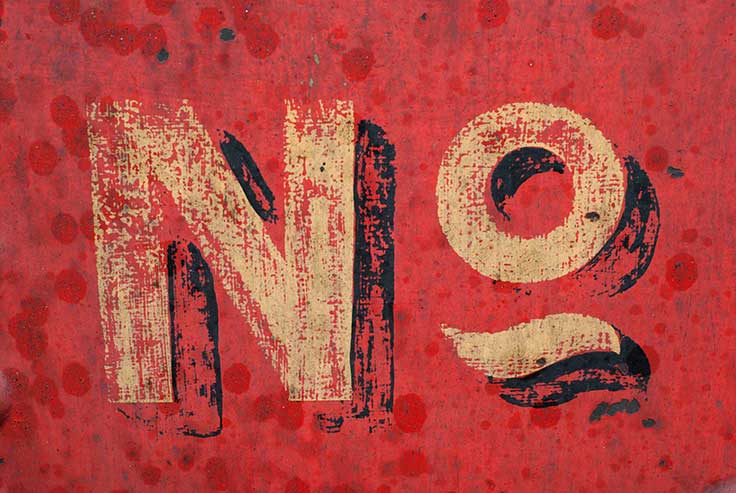
Saying “yes” to something when you really want to say “no” is a sure fire way of taking too much on and sending your stress levels through the roof.
It’s usually because of the fear of upsetting or offending someone else, which is not something that comes naturally to many people.
But it’s important to say what you mean when it comes to controlling stress and avoiding burnout.
So today’s task is to…
Practice different ways of saying no
“No” is a powerful word and there are lots of ways to say it.
Assertive communication is the key.
You don’t have to apologize profusely, make up some tangled excuse, or feel guilty for not wanting to do something.
Stand in front of the mirror and practice different ways of refusing an offer, invitation or request. For example:
“No, I’ve already got something on that day but thanks for asking”
“I’d rather not thanks.”
“I’ll pass on that, but thanks for the offer”
“I’m afraid I won’t be able to do that right now”
“Unfortunately I can’t incorporate that into my schedule right now”
DAY 19: LOOK FOR LAUGHTER

It’s not only your physical health that benefits when you laugh, but your mental health also gets an enormous boost.
Laughter is a powerful antidote to stress thanks to the flood of happy hormones, and the increased blood flow which gives a vital boost to your immune system.
So today’s task is to…
Look for ways to laugh more
You can start by arranging a meet up with a group of friends.
Social connections strengthen immunity and there are more opportunities to laugh when you are with other people that make you happy.
Watch a funny movie together or get tickets for a comedy show.
Think about something you did together that was fun and reminisce about the good times you’ve shared.
On days when you’re not meeting up with someone, it’s ok to find things that make you smile at home instead.
Watch a funny cat compilation on YouTube or ask Alexa or Google Home to tell you a joke. My six year old daughter has even figured out that both of these things can make her smile when she’s having a tough day!
This is one of her favorite videos!
DAY 20: TAKE SOME TIME OUT

When life is busy and stressful it can be hard to find time for yourself. Nowadays it’s the norm to be rushing here, there and everywhere – to and from work, shopping, running the kids around or carrying out other errands you have.
But leisure time and relaxation are important for both mind and body.
So today’s task is to…
Treat yourself to some downtime
Reserve an hour or two of your day and do something for yourself. Schedule an appointment in your planner if you need to.
Put on a face mask and have a relaxing bath with aromatherapy candles.
Calm your mind by doing a jigsaw puzzle or buy an adult coloring book and a set of pencils.
Or get the oxytocin coursing through your body with a relaxing massage.
Making time to relax and focus on yourself will make you more productive in the long run, less stressed and a happier version of who you are now.
DAY 21: CHANGE THE WAY

“Change the way you look at things, and the things you look at will change”.
It’s a powerful quote from the late Dr. Wayne Dyer, best selling self-help author, and motivational speaker who inspired millions to find ways to lead a happier life.
Your final task is to…
Change the way you look at stress
You need to adopt a positive mindset towards stress because the thing that actually triggers a stress reaction in your body is your perception of threat or danger.
So start thinking of situations you normally consider stressful as a challenge you can rise up to instead.
New research shows that the way we think about stress itself matters a great deal.
If you worry about stress and think of it as harmful, it will be harmful to you.
It is the combination of stress itself and your perception of it as an unhealthy state that is so detrimental to your health.
Reward yourself!
Give yourself a well-deserved pat on the back.
You made it through the Challenge and should have started to feel the benefits of the different stress-busting self care methods you’ve been trying.
All of the methods in this Challenge are proven to help in the fight against stress, although some methods will resonate better with you than others.
I’m sure by now you have your favorites, but don’t dismiss the others.
It’s important to keep on top of your stress levels, so go back and try the methods that didn’t resonate with you again.
Some of them take more than one day of practice and the more ways you have to embrace self care in your daily life the better.
Download Your Free Checklist
We’ve put together a checklist that you can print out so you can mark off each action as you try it out. Click here to get the printable PDF.



